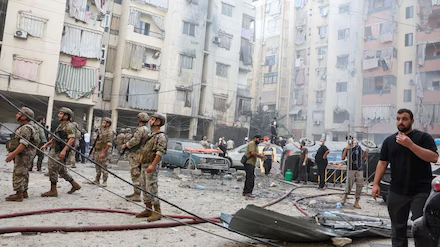A significant escalation in the Israel-Hezbollah conflict occurred on Friday with the killing of Ibrahim Aqil, a top military commander, in an Israeli airstrike on Beirut.
This attack, which targeted the densely populated Dahieh area—a Hezbollah stronghold—resulted in at least 14 fatalities and numerous injuries, further heightening fears of a broader war in the region.
Details of the Airstrike
Hezbollah confirmed Aqil’s death, stating he was among several senior figures killed during the strike. The Israeli Defense Forces (IDF) reported that Aqil was a commander in Hezbollah’s elite Radwan forces and was involved in planning attacks against Israel.
IDF spokesman Daniel Hagari emphasized that these operatives were hiding among civilians, effectively using them as human shields.
The airstrike marks the first major assault on Beirut since July, when another senior Hezbollah leader was killed.
Following the attack, chaotic scenes unfolded as emergency responders rushed to rescue victims from collapsed buildings and debris.
Rising Tensions and International Concerns
The incident has prompted urgent warnings from international officials regarding the potential for a wider conflict.
Rosemary DiCarlo, the UN’s political affairs chief, cautioned that the Middle East is at risk of a conflict that could “dwarf” previous devastation.
She urged all parties to exercise maximum restraint amidst escalating violence.
In response to the airstrike, Hezbollah launched retaliatory strikes against military sites in northern Israel, firing around 140 rockets.
This exchange of fire is part of a larger pattern of violence that has intensified since October 8, following Hamas’s unprecedented attack on Israel.
Historical Context
Aqil’s involvement with Hezbollah dates back to the 1980s, where he played a role in orchestrating attacks against U.S. interests in Lebanon.
His death is seen as a significant blow to Hezbollah, which has been engaged in ongoing hostilities with Israel since the onset of heightened tensions this month.
The recent violence has resulted in hundreds of casualties on both sides and has led to widespread displacement among civilians.
As Israeli forces intensify their operations against Hezbollah and other militant groups, there are growing concerns about a humanitarian crisis unfolding in Lebanon.
The international community is closely monitoring these developments, with calls for diplomatic efforts to de-escalate tensions and prevent further loss of life.
The situation remains volatile, with both sides poised for continued confrontation unless significant measures are taken to restore calm.












